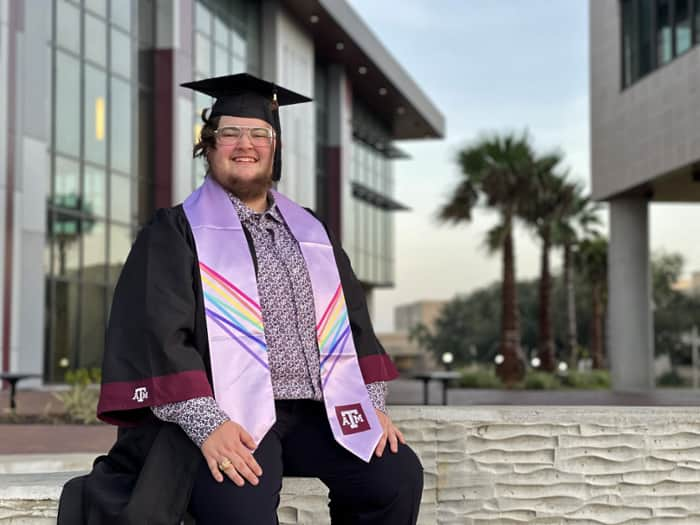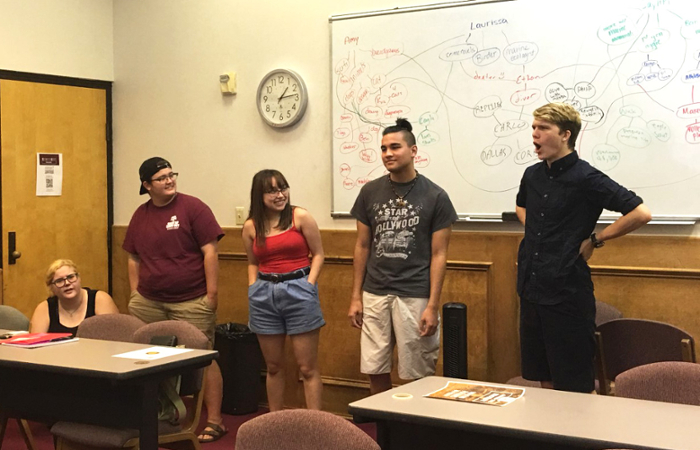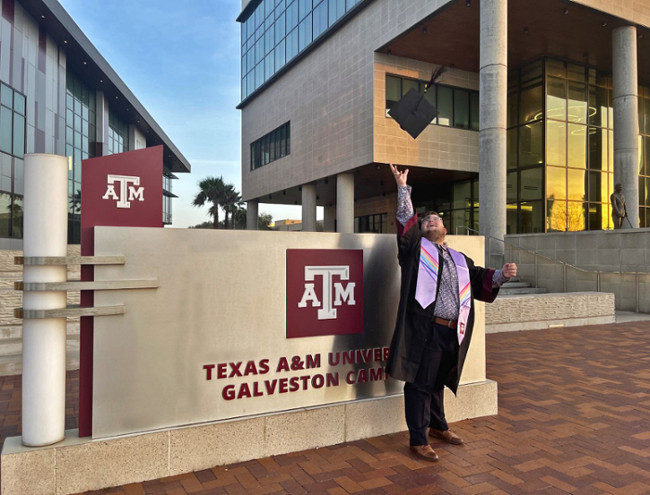Putting the Story in History: Kristopher Prodoehl MAST ‘21
December 17, 2021
Tweet
By Andréa Bolt, Communications Specialist, Division of Marketing & Communications
Like many drawn by the age-old allure of the ocean, Kris Prodoehl ‘21 came to Texas A&M University at Galveston to be a marine biologist. He was 100% sure that working with animals was the future for him. Perfect, he thought. Case closed.
“It turns out the science part…that was definitely not for me!” he says with a laugh. “Thank goodness the whole education part definitely was.”
Prodoehl struggled with the chemistry and biology emphasis of Marine Biology, which reflected in his grades. But after taking a quick post-freshman-year detour to Galveston College, he came back to the Galveston Campus with a renewed mission. It took a few stops and starts, but he was able to hone in on the aspect of aquariums, museums and similar cultural institutions he enjoyed most.
“Honestly, I realized that what I wanted to do with animals was mirrored in the actual topics that are featured in museums. That educational component is the same, the storytelling is really important.”
Prodoehl already had a few Aggie by the Sea friends who opted to minor in Museum Studies, so he similarly added the designation to his new major in the campus’ liberal arts program, Maritime Studies. The minor program is structured to those interested in anthropology, archeology, museums, and similar cultural repositories.
Favorite ‘Pastime’
The switch was perfect. Prodoehl’s grades soared, his career goals sharpened. His next steps came into focus. He dove into everything he could, both on campus and off. Field trips to the Houston Museum of Natural Science, as well as the institution’s off-site storage facility—Aggies by the Sea being the only university student group allowed admittance—were especially inspiring.
He also became heavily involved in the Sea Aggie Pride student group, and the 1973 Center, both helping build community for marginalized students on the Galveston Campus. Since 2017, he has also helped host and co-moderate a Galveston Island transgender support group.

Last summer, he scored a prize internship at the Transgender Foundation of America in Houston. It was a real opportunity to flex his cataloging skills, archival abilities, and so much more.
“They just had thousands of items, queer history artifacts. It’s actually the largest collection of trans history in the world, and I got to go through all of it. I spent 120 hours creating a method of cataloging and documenting all of this history. Awesome, it was awesome,” he said with awe.
At one point, Prodoehl realized the hefty significance of the items in his care and it got to him.
“I called my professor, (Museum Studies Instructional Assistant Professor) Kristin Josvoll, and was like, ‘Am I qualified to do this?’ She told me, ‘The fact that you're even concerned about being qualified enough means that you are. You’ve got this.’ That was a really proud moment for me,” he warmly recalled.
There was one artifact that still takes Prodoehl’s breath away. The tiny newspaper clipping he found in one of the boxes dated back to March 17, 1770. Wedged between ship arrival announcements, the small article featured an extract from a letter containing details of an intersex person. Prodoehl feels this is why artifacts hold such power.
“Seeing a picture is fine and dandy, but seeing items held by someone in history or used in an event gives the person in the museum a connection directly to that historical figure or event,” he explained. “Recently, there’s been a big push in the queer community to really remember our roots and the fact that we’ve always been here, there’s always been queer people around. Seeing this solidification was just reaffirming. Thinking about all this little piece of newspaper went through to get to me, to be in my hands, is just wild to me.”
With Hope for the Future, Look to the Past
Like Prodoehl says, museum theory is all about how we as humans create bonds and attach meaning to different items over time. That reverence toward solidifying connection is the core of Prodoehl’s passion in academia and in life, says Department of Liberal Studies Head Dr. Joann DiGeorgio-Lutz.
“He’s got that can-do attitude and perennial optimism, along with his enthusiasm for learning and discovering new concepts,” which she said clearly reflect in his studies. “He also has a clear vision for his future and I know he will go on to do amazing things, carrying forward our Aggie values.”
Next up for him is something he would never have thought about before coming to the Galveston Campus: graduate school.

Thanks to Department of Liberal Studies Instructional Lecturer Dr. Brett Furth’s thesis writing class, Prodoehl already has a research proposal ready to go. The project dovetails with his overall dream for the future: to create a queer history museum in the South.
“But I don’t want to run it!” he quickly laughs. “I want to be the collections manager. I want to have a hand on all of the historical documents, keep all the records and paperwork in line. I want that to be my contribution to this community, to our history.”
Community, he says, will be the thing he misses most about leaving campus.
"This place really welcomed me in like family. That aspect, and being able to do so much, has been paramount to my experience here. Coming here was absolutely right for me.”
###
Media contact:Communications Specialist
a_bolt@tamug.edu
More:
Read more about Arts & Humanities
Read more about Liberal Studies
Read more about Student Life